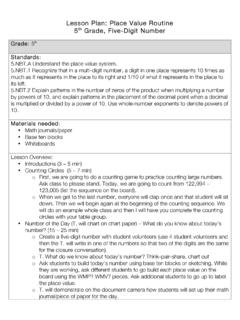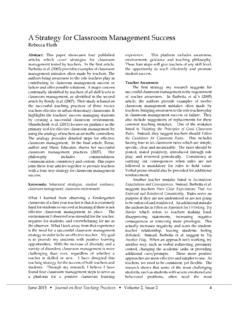Transcription of Eliminating unnecessary workload around planning and ...
1 Eliminating unnecessary workload around planning and teaching resources Report of the Independent Teacher workload Review Group March 2016 Contents Foreword from Chair, Kathryn Greenhalgh 3 Eliminating unnecessary workload around planning , and teaching resources 4 Summary 5 What is the problem? 6 Principles for planning 6 The Challenge 10 Recommendations 11 Acknowledgments 13 2 Foreword from Chair, Kathryn Greenhalgh Teachers are hugely committed professionals who work hard to put the needs of their pupils first. Their role is very rewarding but demanding and teachers want to spend their time on the things that will make the biggest difference to pupils learning and progress. This is why the workload Challenge was so important to me and the colleagues who made up the planning and Resources Review Group. It was a privilege to Chair this group and I was overwhelmingly impressed with the commitment and expertise from the members of the group. They are all passionate about education and stopping bureaucracy from standing in the way of progress.
2 We shared ideas, sought out the best practice in the profession, and looked at evidence to inform our recommendations. We considered planning for lessons and the great lesson plans v lesson planning debate. We looked at lessons being viewed as a singular entity against themes or sequences of lessons. We heard from schools which created collaborative time for their teachers to plan together. We looked at schools which regularly use text books and teacher guides to support published schemes of work and other off the shelf resources to investigate if these save time whilst maintaining quality of provision. Current education policy is supporting far more autonomy and freedom, with schools being invited to lead the system. This gives leaders and teachers far more control over their curriculum and how they teach. It is an ideal time to consider collaborative work, both within schools and across partnerships. This demands a culture where teachers are prepared to share their best ideas and learn from one another.
3 I hope the reports and their recommendations resonate with the teaching profession and they will be used to give school leaders and teachers the confidence to make strategic decisions about what needs to stop and what needs to be done differently. Teachers should not be spending their time on bureaucracy that does not add value. Teachers time should be protected and used to make a difference. Kathryn Greenhalgh Senior Director of Mathematics, Outwood Grange Academies Trust 3 Eliminating unnecessary workload around planning and teaching resources As the workload challenge showed, all parts of the education system have a role to play in reducing the unnecessary tasks that take teachers and school leaders away from their core task: improving outcomes for children. There is no single reason behind excessive workload . Government must always introduce policies with thought and planning . The accountability system must encourage good practice rather than stimulate fads.
4 School leaders must have the confidence to reject decisions that increase burdens for their staff for little dividend. Teachers themselves must be more active in using evidence to determine what works in the classroom. Two things are clear. Nobody intentionally sets out to create unnecessary workload , and everybody involved in education from Government ministers to classroom teachers has a role to play in reducing burdens. This report looks specifically at issues around planning and resources, explaining what the problem is, how it has arisen, and how it can be addressed. It offers a way to make a positive difference. 4 Summary 1. Teachers spend an undue amount of time planning and resourcing lessons, and there are clear measures that should be taken by Government, Ofsted, schools, and teachers to lessen this burden. 2. planning is critical and underpins effective teaching, playing an important role in shaping students understanding and progression.
5 It is the area of work where teachers can bring their passion for a subject and their desire to make a difference together. 3. There is a key distinction between the daily lesson plan and lesson planning . Too often, planning refers to the production of daily written lesson plans which function as proxy evidence for an accountability paper trail rather than the process of effective planning for pupil progress and attainment. 4. Creating detailed plans can become a box-ticking exercise and create unnecessary workload for teachers, taking time away from the real business of planning , whilst offering false comfort of purpose. These burdensome and unhelpful practices have arisen due to the real and perceived demands made by Government and Ofsted, and how school leaders and teachers have reacted to them. 5. School leaders should evaluate how they view planning in their school. All leaders have a key role in ensuring the availability of fully-resourced collaboratively developed schemes of work.
6 Once these are in place, and individual teachers understand the what and why of the curriculum, they can be freed to teach in a way that best suits their professional judgement and experience. Access to good quality schemes of work should reduce workload rather than create it. 6. This can only happen if Government and its agencies commit to sufficient lead-in times for changes for which the sector will have to undertake significant planning to implement. This includes releasing relevant materials in good time. 7. High quality resources, including textbooks, can support teaching, reduce workload by teachers not having to reinvent the wheel , and ensure high expectations of the content of lessons and conceptual knowledge. 8. We recognised that there are cultural issues at play which should be challenged. We heard that much time is spent searching for silver bullet resources, and this can be seen as a proxy for the development of effective sequences of lessons.
7 This time could be more effectively spent in collaborative planning , and engaging with a professional body of knowledge and quality-assured resources that can be shaped to specific classroom contexts. This time needs to be valued by school leaders. 5 What is the problem? 9. Detailed lesson and weekly planning were identified by 38% of the respondents to the workload Challenge as adding an unnecessary burden to general workload . The analysis of responses drew out issues such as requirements around the level of detail in plans they submitted, having to produce annotated seating plans for each lesson and justifying decisions for these, having to change and revisit plans during the course of the week as lessons developed, and having tight deadlines for submitting weekly plans. 10. As with the other two review groups considering marking and data management, we considered the cost benefit in terms of teacher time and the potential for positive impact on pupil progress.
8 Effective planning is the key to effective teaching but it is the unnecessary nature of the work around lesson plans that the group worked to address. Principles for planning 11. Five principles are set out below that we believe should be used to test practice and expectations in schools. These are motivated by a desire to ensure that planning is productive and that workload for teachers is manageable. planning versus Lesson Plans a. planning a sequence of lessons is more important than writing individual lesson plans 12. planning is essential for good teaching but, generally speaking, too much time is spent on detailed, individual lesson plans. Lesson planning is a thinking process, at the heart of teaching, and whilst individual lesson plans can contribute to this process, they can be a proxy for teaching: detailed daily or weekly plans should not be a routine expectation. 13. An end to this expectation does not mean an end to planning , but that less emphasis should be given to the administrative burden of individual plans at the expense of collaboratively produced schemes of work.
9 We suggest that the weight given to individual lesson plans to evidence both planning and teaching should be reviewed and reduced. Burnt-out teachers are not best for pupils. 14. Where written lesson plans are deemed appropriate, their purpose and audience should be made very clear: the fundamental purpose of planning is to support effective teaching in the classroom, not to satisfy external audiences. Plans cannot show what actually happened in the classroom, nor the outcomes or progress made. They can provide a useful tool for professional discussion for example between a teacher and a subject head or head of phase to help understand and explain teaching decisions but should not be seen as an end in themselves. 15. There should be greater flexibility to accommodate different subject demands and needs, as well as the specific demands of primary phases. Subject and phase leaders 6 should decide and use the best planning tools to suit the particular demands of the subject or age group, rather than necessarily following a whole school generic tool.
10 Individual teachers should be able to choose the best format for their working plans to suit their level of confidence, experience and preference, agreeing the rationale for this choice with the subject or phase lead. In this way not only can the subject do the talking, but it can allow the teacher to reconnect with their love of teaching. 16. Senior leaders should consider the cost benefit of creating larger blocks of time for this practice to make the planning activity as productive as possible and reduce the amount of time spent by individual teachers on individual planning . b. Fully resourced schemes of work should be in place for all teachers to use each term 17. We recognise that pupils make progress by building content and conceptual knowledge over time. Doug Lemov, for example, refers to a double planning method whereby objectives, resources and feedback are intertwined in a series of lessons .1 planning should therefore identify what needs to be taught across a sequence of lessons, and avoid trying to fit teaching neatly into 60-minute chunks.















